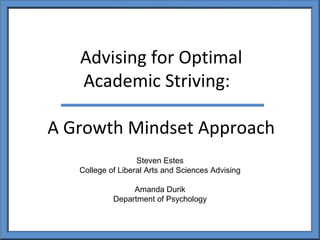
Mindset 2012 NIU Advising Summit Presentation
- 1. Advising for Optimal Academic Striving: A Growth Mindset Approach Steven Estes College of Liberal Arts and Sciences Advising Amanda Durik Department of Psychology
- 2. How can we promote a mindset that enables: • Persistence—even when depressed? • Success across cultures and ability levels? • Resilient confidence? • Willingness to benefit from developmental courses?
- 3. Opportunities to promote academic striving: Appointments Orientation UNIV 101 MAP-Works/OSAS Engaged Learning ACCESS & many more!
- 4. Advising Models & Assumptions About Motivation Prescriptive Developmental Intrusive “limited largely to “…satisfaction in “Motivation is not the producing high work cause, but the result grade, gaining credit accomplishment of intrusive for the course, or stemming from a intervention obtaining a degree in natural striving activities.” order to realize a toward self- certain level of enhancement…” income…” Crookston Crookston (1994) Earl (1988) (1994)
- 5. Appreciative Advising (Bloom, Hutson, & He 2008): Motivation is “discovered” through open-ended questions about their “dream” aspirations. “Instilling” Motivation* “Eliciting” Motivation* “You can do it!” Open questions “I know you have what it takes!” Listen for Desire, Ability, Reason, Need (DARN) statements “Keep at it!” Looking back/forward Exploring goals/values Selling on benefits of education *Examples from Starks (2012)
- 6. What if a research based model of motivation could… • Define effective ways to instill motivation? • Focus our attempts to elicit motivation?
- 7. An Overarching Theoretical Model Dweck (1986, 2006) Motivation in achievement situations is guided by how learners/athletes/employees conceptualize their abilities
- 8. Mindsets (Dweck, 1986, 2006) Fixed Mindset Growth Mindset intelligence is a fixed trait intelligence is a malleable quality that can change and grow Slide adapted from mindsetworks.com
- 9. What Mindsets Do Fixed Mindset Students Say Growth Mindset Students Say Looking Smart is Most Important Learning is Most Important “The main thing I want when I do “What is really important to me in my school work is to show how my classes is whether I learn good I am at it.” something.” Effort is negative Effort is positive “To tell the truth, when I work hard “The harder you work at something, at my school work it makes me feel the better you’ll be at it.” like I’m not very smart.” Slide adapted from mindsetworks.com
- 10. What Mindsets Do Fixed Mindset Students Say Growth Mindset Students Say Helpless response to failure Resilient response to failure “I would spend less time on this “I would work harder in this class subject from now on.” from now on.” “I would try not to take this “I would spend more time studying subject ever again.” for the tests.” “I would try to cheat on the next test.” Slide adapted from mindsetworks.com
- 11. What Does the Research Say? Achievement Correlational Studies: Univ. of Southern CA students—growth mindset related to increase in confidence after challenge (Robins & Pals, 2002) University of Hong Kong students—growth mindset related to desire to take optional English course (Dweck, 2006) University students—for growth-minded chemistry students, more challenge more interest (Dweck, 2006) University students—for fixed-minded students, higher grades early on more interest (Dweck, 2006)
- 12. What Does the Research Say? Emotional Well Being Correlational Studies: University students—growth mindset predicted less depression during the spring semester (Dweck, 2006) NIU freshman—growth mindset about shyness predicted reductions in anxiety 7 months later (Valentiner et al., 2011)
- 13. Experimental Test Of Mindset Effects (Blackwell et al., 2007) Randomly assigned 7th grade students to: 1.Growth mindset condition OR 2.Control condition Measured math grades pre- and post-intervention
- 14. Experimental Test: Math Grades in Junior High School (Blackwell et al., 2007) Growth mindset Control
- 15. Experimental Test Of Praise Effects (Mueller & Dweck, 1998) Students take a test and receive randomly assigned positive feedback: 1.Intelligence praise: “Wow, that’s a really good score. You must be smart at this” OR 2.Effort praise: “Wow, that’s a really good score. You must have tried really hard.” OR 3.Control praise: “Wow, that’s a really good score. Then, all students take a more difficult test
- 16. Test Of Praise Effects: After The Difficult Test (Mueller & Dweck, 1998) Intelligence Effort Praise Lower Higher confidence confidence After Lower Higher difficult motivation motivation test Lower Higher Performance Performance Slide adapted from mindsetworks.com
- 17. Test Of Praise Effects: Performance After Negative Feedback (Mueller & Dweck, 1998) 6.5 6 # of Problems Solved Effort Praise 5.5 Control Praise Intelligence Praise 5 4.5 Initial test Trial 1 Test after negative feedback Trial 3 Slide adapted from mindsetworks.com
- 18. Test Of Praise Effects: Students Who Lied About Low Scores (Mueller & Dweck, 1998) 0.4 0.3 Proportion of Children 0.2 0.1 0 Intelligence Control Effort Slide adapted from mindsetworks.com
- 19. So, how does this apply to advising?
- 20. Effort is good Negative performance feedback helps identify room for improvement Difficult work leads to learning Putting it into practice…(role-playing activity)
- 21. References Blackwell, L. S., Trzesniewski, K. H., & Dweck, C. S. (2007). Implicit theories of intelligence predict achievement across an adolescent transition: A longitudinal study and an intervention. Child Development, 78, 246-263. Bloom, J.L., Hutson, B.L., & He, Y. (2008). The appreciative advising revolution. Urbana- Champaign, IL: Stipes. Crookston, B. B. (1994). A developmental view of academic advising as teaching. NACADA Journal, 14(2), 5-9. Dweck, C. (2006-02-28). Mindset: The new psychology of success. Random House, Inc.. Kindle Edition. Earl, W. R. (1988). Intrusive advising of freshmen in academic difficulty. NACADA Journal, 8 (2), 27-33. Mueller, C. M., & Dweck, C. (1998). Praise for intelligence can undermine children’s motivation and performance. Journal of Personality and Social Psychology, 75, 33-52. Robins, R., & Pals, J. (2002). Implicit self-theories in the academic domain: Implications for goal orientation, attributions, affect, and self-esteem change. Self and Identity, 1, 313– 336. Starks, S. R. (2012). Enhancing Student Motivation. Retrieved 16 September 2012 from http://distanceadvising.com/2012/05/enhancing-student-motivation/